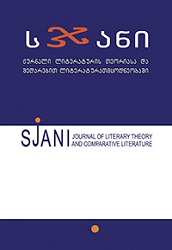შოთა რუსთაველი უტილიტარისტების წინააღმდეგ
Shota Rustaveli Against the Utilitarians
Author(s): Levan BregadzeSubject(s): Language and Literature Studies, Georgian literature
Published by: ლიტერატურის ინსტიტუტის გამომცემლობა
Keywords: Rustaveli; utilitarians; happiness; joy; woe; balance;
Summary/Abstract: In this paper three aphorisms from Shota Rustaveli’s epic poem “The knight in the panther’s skin” are analyzed: 1) “Who then can harvest joy who hath not first travailed with woe?” (Translation by Marjory Scott Wardrop). 2) “Then is joy pleasant, when a man hath passed through grief” (Translation by Marjory Scott Wardrop). 3) “A man unacquainted with sorrow cannot find pleasure in joy” (Translation of Marjory Scott Wardrop). The meaning of these aphorisms can be summarized in this way: joy cannot be fully enjoyed, unless you have experienced woe (grief, sorrow). Or: if it is even possible to come to joy (to obtain joy) without hard work or grief, it is anyway better to come to it in overcoming the woe because only in that case can we fully enjoy it. This point of view opposes the utilitarian understanding of happiness, which is thus defined: “Happiness is maximization of pleasure and minimization or, even better, elimination of pain”. This view, that was invented in the 18th century by one of the founders of utilitarianism, the English philosopher Jeremy Bentham, appears to be right at the first glance and has still today great influence on the way of life of people. But if observed closely, it does not stand up to criticism, as we can see in the work about happiness by the German philosopher Wilhelm Schmid (Wilhelm Schmid. Glück. Frankfurt am Main und Leipzig: Insel Verlag, 2007). According to the contemporary German philosopher, the new founder of the philosophy of life, Wilhelm Schmid: “Unfortunately, this definition has crucial weak points: The essential characteristic of pleasure is that it does not last; everyone can experience this in their own life. Wanting to maximize the pleasure until everything just “makes pleasure” has only one consequence: to miss it more and more to the point of being unable to find pleasure. And the other part of the definition of the modern happiness is also problematic: wanting to consistently switch off pain results not only in your no longer knowing the contrast to pleasure, but also losing orientation in life – because pain is the sting that time and again makes us to think about the entire life.” (Wilhelm Schmid. Schule der Lebenskunst. Tbilisi: 2003). The above cited aphorisms of “The knight in the panther’s skin” inspire a most important idea, namely, that life can only be really beautiful, if the joy and the woe balance each other. Let us see now the point of view of Wilhelm Schmid about what kind of life can be called beautiful: “The real power of beauty does not lie in perfecting, superficially smoothing and harmonizing existence, but in the possibility of affirming it. Not only can the pleasant, pleasurable or, as it was often called in the late 20th century, “positive” be affirmative, but also the unpleasant, painful, “negative” – because it can give us a deeper experience that takes us further. The beautiful also includes the failure, it is crucial whether life as a whole appears to be affirmative.” (Wilhelm Schmid. Schule der Lebenskunst. Tbilisi: 2003). As we can see, the difficult question of relationship between woe and joy, that is even more relevant today than it was in the past, is at Rustaveli solved in exactly the same way, as is demanded by the modern progressive philosophical thinking.
Journal: სჯანი
- Issue Year: 2020
- Issue No: 21
- Language: Georgian

